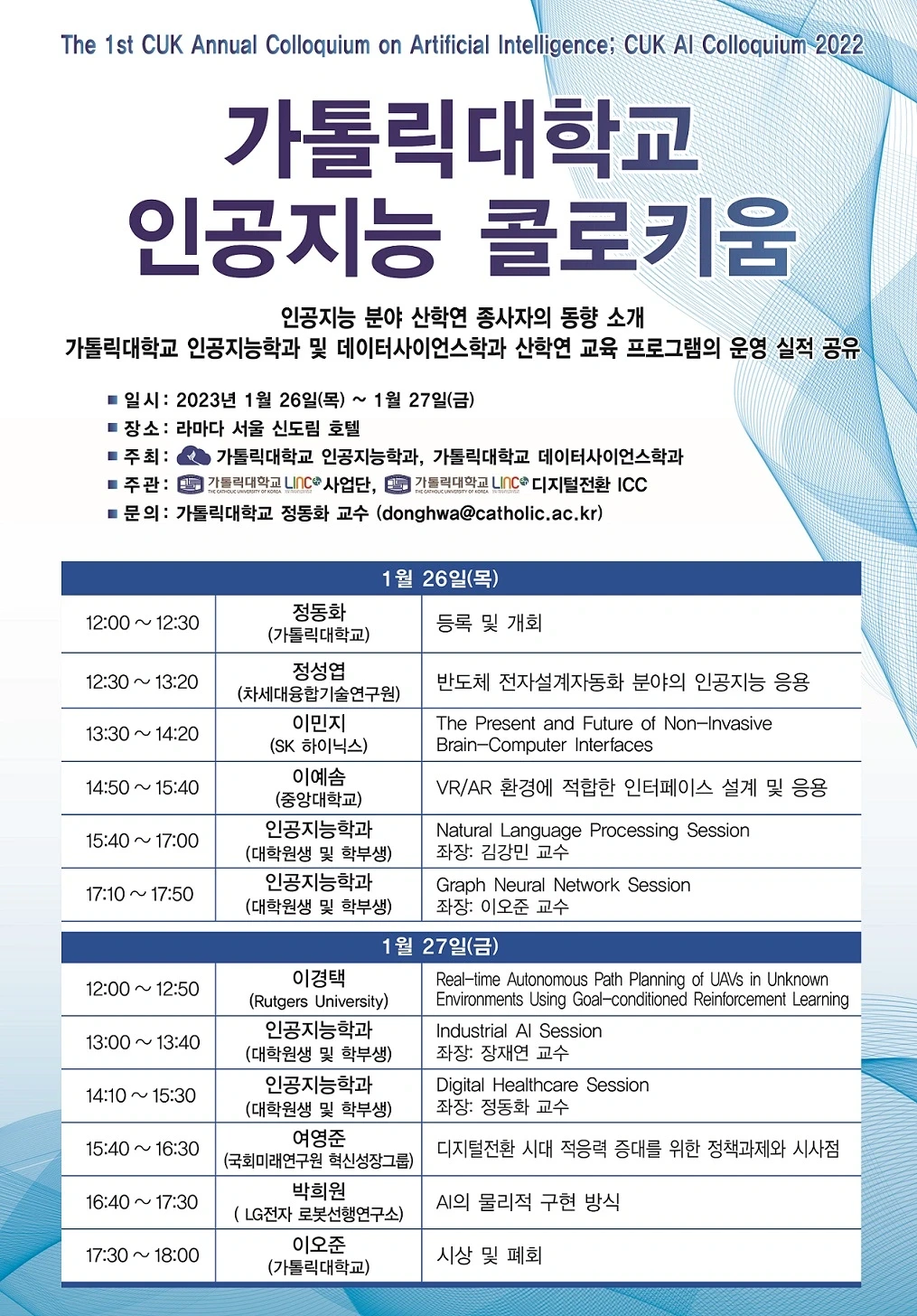Call for Papers of the 1st CUK Annual Colloquium on Artificial Intelligence
(CUK AI Colloquium 2022; 제 1회 가톨릭대학교 인공지능 콜로키움)
Aims and Scope
The CUK Annual Colloquium on Artificial Intelligence is a workshop series that brings together graduate and undergraduate students from the Department of Artificial Intelligence at the Catholic University of Korea to present and discuss their research with experienced scholars in the field. This year’s colloquium will offer attendees the chance to learn from keynote speakers and panelists on a variety of topics, including career paths in academia, industry, and entrepreneurship, as well as the latest advances in AI research.
In addition to presentations and panel discussions, the colloquium will feature intensive and interactive mentoring sessions. These sessions provide participants with the opportunity to engage in meaningful dialogue with their peers and senior academic mentors about their research and career goals. These sessions are designed to be collaborative and forward-thinking, helping attendees to become active participants in the research ecosystem and fostering lifetime collaboration opportunities.
Keynote Speeches
Sungyeop Jung, Advanced Institute of Convergence Technology, Rep. of Korea
- Topic: 반도체 전자설계자동화 분야의 인공지능 응용
- Abstract: 현재 우리는 디지털 대전환(digital transformation)을 맞고 있다. 디지털 대전환의 시대에는 필연적으로 데이터의 양이 폭발적으로 증가하게 될 것이다. 데이터를 획득하는 센서가 전통적인 컴퓨터와 통신기기 뿐만 아니라, 사람, 자동차, 시계, 로봇 등 모든 사물(internet of things, IoT)에 탑재되어 상시 운용된다. 더 나아가, 이러한 사물이 인공지능(artificial intelligence, AI)을 통해 지능화(artificial intelligence of things, AIoT)되어 사람을 대신해 획득한 데이터를 기반으로 정보를 생산하고, 학습을 통해 지식을 축적하여, 지식을 기반으로 지적인 추론과 판단을 하게 된다. 그 대표적인 사례가 자동차 이다. 자율주행 자동차(혹은 스마트 카)라고 불리는 현대의 자동차에는 기존에 사람이 수행하던 운전과 길 찾기 등 지능이 필요한 대부분의 활동을 대신해주는 제어 장치가 탑재되어 사람에게 최소한의 관여만 요구하게 되었다. 앞으로는 이러한 변화가 자동차 뿐만 아니라 우리 생활 전반으로 확산될 것이다. 더불어, 구글 딥 마인드의 알파고가 구현된 1202개의 CPU와 176개의 GPU로 구성된 분산형 하드웨어에서 더 나아가 인공지능 알고리즘을 저전력/고성능으로 수행하는 특수한 반도체에 대한 연구 개발이 더욱 가속화 될 것이다. 본 발표를 통해 인공지능 반도체의 정의와 발전 연혁에 대하여 간략하게 제시하고, 이러한 반도체를 설계하는 활동에 인공지능이 어떻게 활용 될 수 있는지에 관한 사례도 함께 살펴보고자 한다. 인공지능과 반도체의 융합에 관심이 있는 청자들의 많은 호응을 기대한다.
Minji Lee, SK Hynix, Rep. of Korea
- Topic: The Present and Future of Non-Invasive Brain-Computer Interfaces
- Abstract: A brain-computer interface (BCI) is a direct communication pathway between the brain signals and external devices, and refers to a technology that converts brain signals into computer commands to control external devices such as robot arms and legs. Recently, with the development of artificial intelligence technology, many studies using BCI have been actively conducted. In this talk, I will explain the fundamental concepts and principles of BCI and introduce the latest research using representative paradigms such as motor imagery and imagined speech. In addition, we will briefly discuss the problems and solutions facing BCI. These BCI technologies are closely related to our lives as next-generation interfaces that can help patients clinically for rehabilitation purposes and can also help us directly with sleep aids that improve sleep quality. Detailed techniques and application methods will be discussed in the talk.
Yeasom Lee, Chung-Ang University, Rep. of Korea
- Topic: VR/AR 환경에 적합한 인터페이스 설계 및 응용
- Abstract: 최근 코로나19로 인한 비대면 시대가 도래 되면서, 메타버스 환경에 적응하고 있다. 대부분의 일자리가 재택근무, 키오스크, 온라인으로 전환 및 비대면으로 활성화되면서 사람들이 서로 대면하고, 대화하던 일상에서 컴퓨터, 모바일 환경 없이는 단순 업무도 하기 어려울 정도로 빠르게 변화하고 있다. 특히, 서울시의 교통수단인 버스와 대표적인 카페인 스타벅스에서는 각각 현금 없는 버스, 매장을 시범 운영 중이다. 이처럼, 대면서비스에서 메타버스로 발전하는 사회에서 가상현실(VR: Virtual Reality)와 증강현실(AR: Augmented Reality)에 대한 관심과 중요성 또한 증가하고 있다. 가상현실과 증강현실은 게임 콘텐츠라고 단정짓기 쉽지만, 현재는 교육, 수술과 같은 의료 훈련, 소매업, 수리 및 유지보수, 디자인 및 모델링 협업, 관광 및 홍보, 엔터테인먼트 등 다양한 산업에 활용되고 있다. 메타(Meta)사의 오큘러스(Oculus), HTC(High Tech Computer Corporation)사의 바이브(Vive), 마이크로소프트(Microsoft)사의 홀로렌즈(Hololens) 등 다양한 장비들이 매년 출시되고 있으며, 용도/성능 등에 따라 각 장비들의 차이점이 존재한다. 대부분의 응용 프로그램은 앱 형태인 콘텐츠로 제공되고 있으며, 개발을 위한 엔진은 언리얼(Unreal)과 유니티(Unity)가 있다. 대부분의 콘텐츠는 초보자가 간단한 게임을 만들기에 쉬운 편인 유니티로 개발하고 있다. 산업의 발달에 따라 온라인 홈페이지가 필수였던 세대에서 사용자 편의를 위한 모바일 앱의 필요성이 증가하게 되었고, 현재는 2D에서 3D 모바일 앱에 대한 수요가 증가하면서 앞으로는 간단한 앱들도 3D화 하여 제공하는 기술이 고도화되고 있다. 본 발표에서 콘텐츠를 연구, 설계, 개발하는 사례를 통해 3D, 4D로 향하는 VR, AR, MR(Mixed-Reality)과 같은 확장현실(XR: eXtended Reality)에 대하여 알아보는 시간을 가지려 한다.
GyeongTaek Lee, Rutgers University, USA
- Topic: Real-time Autonomous Path Planning of UAVs in Unknown Environments Using Goal-conditioned Reinforcement Learning
- Abstract: In the path planning problem of an unmanned aerial vehicle (UAV), the environment and mission of a UAV are typically predefined. The aim of existing research has been to successfully perform a single mission of reaching a target point. In this paper, however, we address a new path planning problem for a UAV by training the UAV to be controlled by subgoals to cope with unknown environments. The subgoals can be defined by the user and provided to the agent in real time. That is, the UAV can perform diverse flight missions without knowing the environment in advance. To achieve this study goal, we utilize goal-conditioned reinforcement learning to train the UAV agent to reach various goals by learning diverse flight maneuvers. In experiments, we designed several specific scenarios in which the UAV agent is encouraged to perform concrete missions to confirm the ability of the UAV agent. Experimental results show that the UAV agent trained in a simple training environment using the proposed approach can accomplish difficult missions such as high-flying, low-flying, penetrating, and bypassing in real time in unknown environments. We expect the proposed approach to be utilized in fields that need to address unexpected situations in real time.
Yeongjun Yeo, National Assembly Futures Institute, Rep. of Korea
- Topic: 디지털전환 시대 적응력 증대를 위한 정책과제와 시사점
- Abstract: 초지능화 기술의 확산은 생산현장, 기업 및 산업 간 관계, 노동시장, 가계소득 등에 다양한 경로를 통해 영향을 미침으로써, 경제사회 체제의 전환을 촉진할 것으로 예상된다. 4차 산업혁명으로 일컬어지는 디지털전환 기술발전이 미래 국가 경제사회시스템에 미치는 영향에 대해, 낙관론적인 전망과 자동화로 인한 일자리 대체 위험과 사회적 불평등 확대 등을 경고하는 비관론적 예측이 서로 엇갈리고 있다. 하지만 지능형 자동화의 급속한 발전이 미래 경제사회에 미치는 영향은 사전적으로 정해져 있는 것이 아니라, 정책적 대응을 통해 어떻게 긍정적 영향을 부정적 영향보다 크게 만들 수 있느냐에 달려 있다. 현재 정부는 글로벌 기술경쟁력 확보와 기술 패권 확보 등을 목적으로 하여, 디지털 전환 기술 패러다임 촉진을 도모하기 위한 다양한 정책을 추진하고자 노력하고 있다. 이에 반해, 디지털 전환에 따른 잠재적 위험 요소 등에 대한 체계적 탐색과 이에 대한 대응책 마련은 다소 지지부진한 상황이다. 미래 경제사회의 지속가능한 발전을 도모하기 위해서는, 단순히 성장과 발전 중심의 혁신정책을 넘어, 얼마나 빠르게 충격과 위기 등 불안정 요소를 극복해낼 수 있는지와 관련한 리질리언스 역량 확보가 중요하게 고려될 필요가 있다. 이러한 배경에서, 본 연구에서는 디지털 전환 시대 우리나라 경제사회시스템의 적응력 증대와 기술 패러다임 주도를 위한 미래지향적 혁신정책 수립 방향을 제안하고자 한다.
Heewon Park, LG Electronics, Rep. of Korea
- Topic: AI의 물리적 구현 방식
- Abstract: 빠르게 발전하던 로봇 기술은 최근 고령화, 1인 가구의 증가, 그리고 코로나로 인한 비대면 환경 등의 사회적 요소로 인해 사업적으로도 크게 확장되고 있다. 우리 생활에 스며들고 있는 여러 로봇 내부에서는 영상처리, 작업계획, 자연어처리, 제어 등의 여러 기술 분야에서 인공지능이 응용되고 있다. 본 강연에서는 로봇 분야에서 인공지능이 어떻게 활용되는지를 알아보고, 로봇 사업화의 방향과 그에 필요한 핵심 기술들에 관하여 논의하고자 한다.
Submissions
We invite the following two kinds of papers:
- Research papers (Maximum 7 pages excluding references)
- Position papers and demos (Maximum 5 pages excluding references)
All manuscripts have to be formatted according to the LNCS (Lecture Notes in Computer Science) template. Also, manuscripts must be submitted in PDF files through the following e-mail address.
Important Dates/Tentative Schedule
- Submission deadline: Jan 10th, 2023
- Acceptance Notification: Jan 12th, 2023
- Presentation Materials Due: Jan 17th, 2023
- Final Manuscript Due: Jan 25th, 2023
- Colloquium: Jan 26th-27th, 2023
Venue




